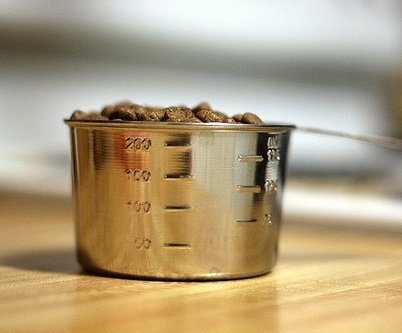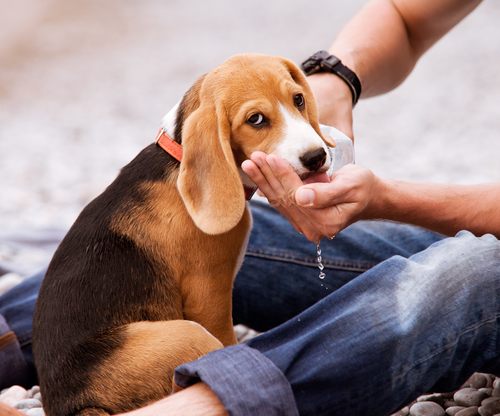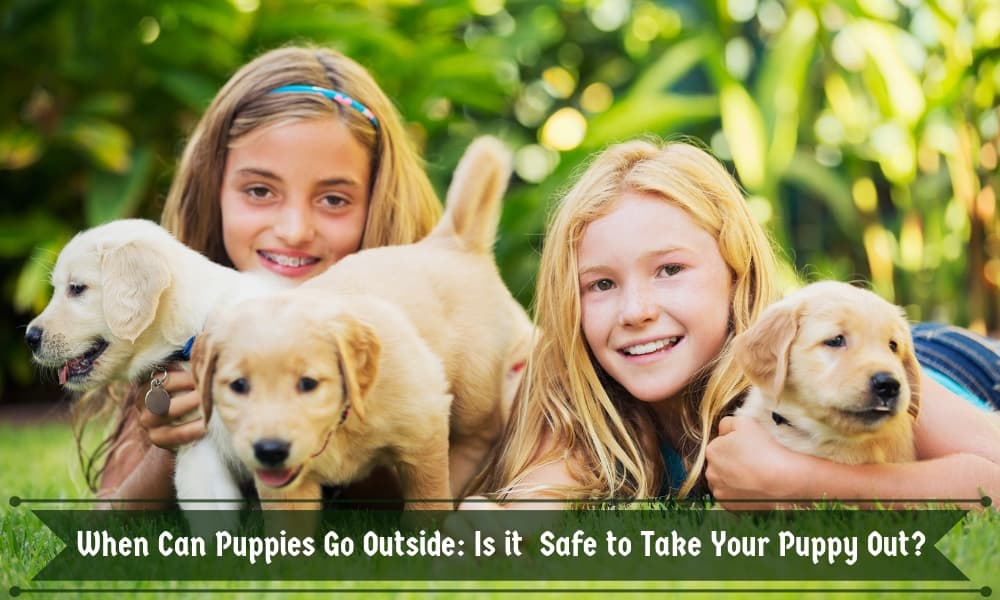
What is everyone’s favorite topic? Puppies! Yes, if you have a new puppy, you’re probably curious as to how to take care of them. It may sound slightly odd that there is a certain age where puppies are able to go outside but, trust us, it’s very important that you take this into consideration. Even though you may be so excited to show everyone your new puppy, their health is more important!
Is it safe to take your puppy out? It depends on where they are. For the most part, you should wait until your puppy is fully vaccinated and conditioned, slowly getting used to their environment so nothing happens to them. You may think it is overly cautious to prevent your puppy from going into populated places or public places in general but there are various canine viruses and diseases all around that not everyone is aware of.
Being cautious for a few weeks until your puppy is better prepared for the outdoors can really benefit you in the future by preventing anything bad from happening as unnecessary trips to the vet.
Contents
How to Protect Your Puppy
Puppies need a little more care than you might think. They are still young and their immune systems are completely different from ours. Even if you’re tempted to take your puppy to the dog park, considered these things first.
- Vaccinations. Puppies are very vulnerable to diseases. Before you take your puppy outside, make sure you get them vaccinated first. Puppy vaccinations begin at just 8 weeks old and require two separate injections. The second vaccination is given around 2-4 weeks after the first, depending on what your veterinarian recommends. It takes both doses to ensure your puppy is protected and ready to head outdoors. Depending on where your puppy came from, their previous home may have already administered them shots. Make sure you get the paperwork if that is the case so you can show them to your vet.
- Carry your puppy. As many of us know, dogs are very curious creatures. They love to sniff and tug on their leash and try to take the lead. Puppies, however, are still learning and don’t understand what it means to move away from an interesting sniff. Carrying your puppy ensures that they won’t contract anything from walking about without their vaccinations and don’t ingest something that can be harmful.
- Make sure other house pets are fully vaccinated. If you’re bringing your puppy to where you have other pets, make sure they are also vaccinated or else your puppy may contract something. Even if you haven’t vaccinated an older dog and you think it’s okay, remember that dogs can carry many different canine viruses and diseases. Better safe than sorry.
But My Puppy Still Needs To Be Toilet Trained!
Your puppy probably still needs to be toilet trained if they weren’t beforehand. No one wants to clean up a puppy mess in their home, especially when it can be avoided. The best time to train a puppy is in the first few months. Again, toilet training is a must.
Even without vaccinations, your puppy can go outdoors in front of your home or in a private greenspace because you can ensure that there are no harmful things your puppy will be exposed to. You can clean the area so it is a suitable environment for your puppy and make it puppy proof. Just as long as no other dogs who could potentially not have been vaccinated are in the area, you should be good!
How Should I Take My Puppy Out Without Their Vaccines?
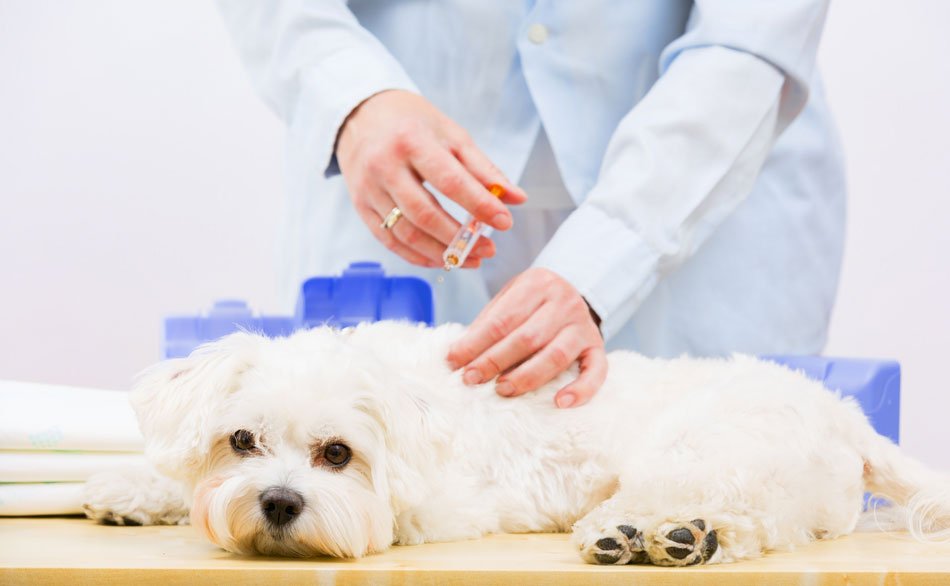
Being outdoors is very important for any puppy in the early stages. It allows them to get used to their environment and helps them develop. When you first get your puppy, you might wonder how you will let them out, especially if they have yet to get their vaccinations. Don’t worry! It’s okay to let your puppy outside into the yard as long as it is safe and you are always right beside them. Here are a few details to keep in mind:
- Keep your puppy in a fenced area. If you’re letting your puppy go outdoors without their vaccinations, keep them in a fenced area, preferably a backyard or, if that is not possible, contained to a small area so your puppy does not get into anything!
- Don’t let your puppy sniff other dog’s feces. Fecal matter can contain previously eaten toys, socks, and belongings. Don’t let your puppy sniff any other dog’s fecal matter or else they may eat something that is contaminated with disease.
- Always keep an eye on your puppy. Puppies are notorious for wandering and sometimes it’s easy to lose sight of them. Always make sure you’re watching your puppy so they don’t get into anything or wander off.
- Introduce your puppy to the world without compromising their health. Allow them to go to areas that you know are safe. Carrying them to local places so they can get a sense of everything allows them to still be safe while also allowing them to be outdoors without compromising their health.
When Should I Take My Puppy Out?
The best time is after your puppy has received its vaccinations because they are protected. You may find that your puppy might be a little overwhelmed and won’t want to go out for a walk. That is okay and it is completely normal!
Part of every puppy’s growth is learning to get out of the house and getting comfortable in the outdoor environment. Similarly to humans, puppies are doing a lot of growing in their first few months – not to mention they are in a new home Take it easy on them and yourself because you’re both going through this together.
Take your puppy on a short walk for about 10 minutes every day and allow them to gradually adjust. Forcing your puppy on a walk when they are reluctant can be strenuous on them so take time to let your pup adjust.
On the days prior to your puppy’s full vaccination, make sure you start by taking them out on days where the weather permits. Your puppy is still vulnerable and their immune system is still developing. Days when it is too hot, too cold, or too rainy can prohibit your puppy’s growth.
Is It Safe For My Puppy To Be Around Other Dogs?
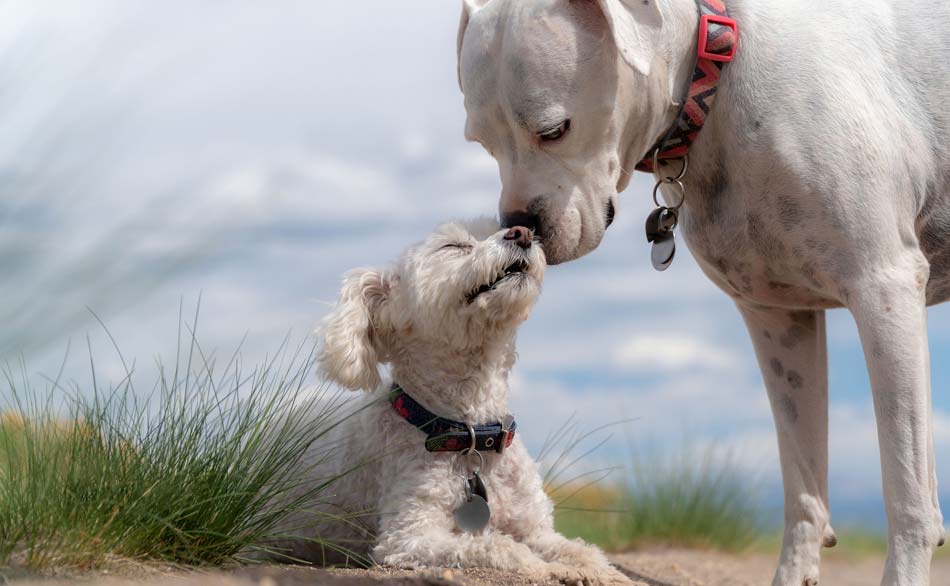
A huge part of growing is puppy socialization. Puppies grow more comfortable and learn to be less aggressive to other dogs and humans when they interact with them early and often. To prevent future behavioral problems, surround your puppy with positive interactions. Consider first letting those closest to you interact with your puppy and, later, place your puppy in low-risk environments with either dogs or puppies who are well trained and can be trusted.
If you constantly carry your pup everywhere, they will become afraid and more dependent on you which makes for a terrible scenario if you have to leave them in the future. Even though you want a strong connection with your puppy, you also want to allow them the freedom to learn and grow to avoid problems in the future.
When socializing your puppy, a good way to help them ease into their new environment is by praising them and awarding them with treats (but not all the time, of course, they might get greedy). Pairing a reward and/or praise helps them to differentiate between good and bad behavior. This is a large part of training your puppy as well!
Going on walks the first three months is crucial for socializing and puppy development. Make sure you are there with your puppy every step of the way to create a bond and make them feel like you are there to protect and care for them. That being said, do not coddle them and play the role of the “helicopter parent” because that inhibits their ability to interact as well as creates a greater dependence on you.
Here are a few more key ideas about socializing your puppy.
- Introduce your puppy to a few friends and family. Getting a new puppy can be exciting and all you want to do is show them off. Take into consideration that your new family member is being exposed to a new environment and new people. Introducing your puppy to friends and family a few people at a time helps them to not be so overwhelmed while also getting used to being around people. This also limits any potential negative activity that can occur.
- Interactions with fully vaccinated dogs. You don’t want your puppy to bark or become aggressive to dogs in the future, especially when you’re out on a walk! Let your puppy socialize with other dogs that are fully vaccinated since your puppy is still growing and they are very vulnerable at a young age. Surround your puppy with dogs that you know are well behaved. Puppy playdates are a great idea, especially if you have a friend who has a dog or a puppy.
- Puppy training! Puppy training is a great way for your puppy to become more comfortable with other dogs because all dogs must have proof of vaccination. This means that your puppy will be safe and it allows you to form connections with other people which could mean potential playdate options! Puppies are fearless and curious little things so having them around other puppies can benefit their growth and development.
I grew up in a household that was filled with animals. I believe that my fate as a dog-loving person was sealed in early childhood since my parents owned several dogs of varying sizes and breeds. There was no choice but to take care of and learn about dog habits and the best animal care practices — otherwise, I’d be clueless about how to go about the creatures I was surrounded by day and night.
As a life-long puppy lover, I know a thing or two about dogs and how to go about caring for them in the best way possible. Although I’m not a professionally trained dog behaviorist, trainer, or veterinarian, all of my knowledge and experience with canines comes from a place of love and a deep-rooted passion for dogs and animals in general.
Seeing as dogs kept me company throughout every stage of my life, I decided to follow a different path in my academic life and obtained a Bachelor’s and Master’s degrees in Marketing Management and Digital Advertising, which ultimately allowed me to combine my professional training and personal experience by creating the ultimate dog lover’s resource website! Along with my husband, Dave, I run MySweetPuppy for like-minded dog lovers who want to have a single, clear, and reliable information source about anything and everything related to dogs and their well-being.

